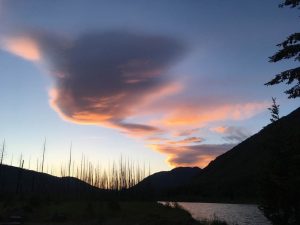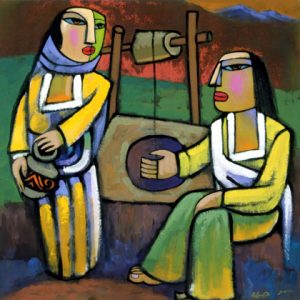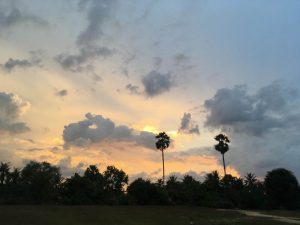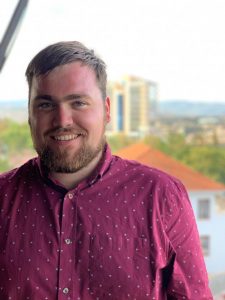Home Waters
The North Fork of the Flathead River is the most beautiful river on earth. This, of course, is a personal opinion, but anyone who has spent time on the river would likely agree. The deepest point of the largest channel marks the western boundary of Glacier National Park, and on the other side of the river is the vast Flathead National Forest. Cutthroat trout return to tributary creeks every year to spawn. Grizzly bears are frequently spotted along the banks. A day without seeing an osprey or a bald eagle while rafting on the North Fork is considered an odd occurrence.

The North Fork River in northwest Montana
The splendor of the North Fork makes it a natural place to talk about the Creator. The mountains, the fresh air, the cold water, all of it: the place is as ripe with holiness as it is with huckleberries. I had the privilege, during the summers of 2014-2017, of guiding high schoolers down the river and through conversations about their own faith when I served as a raft guide with Flathead Lutheran Bible Camp. Experiencing something as big as the peaks towering over 3,000 feet above had a way of reminding us how small we are compared to a God who created everything.
The deeper challenge, then, and the challenge I posed to all of my high school groups, is to see God in all that God created: everything. It’s easy to see a place like the North Fork, protected by law to remain undisturbed, and say “God is here!” It takes a more practiced eye to see a scraggly weed in a movie theater parking lot as part of the same beautiful Creation. For many of our campers, leaving camp meant returning to the midwest, which was full of agricultural lands, sediment-rich waters, and hardwood forests. If those campers could see God in the natural world back home, despite the vast difference between those landscapes, it meant they could also be in tune with the ways God was alive in their lives.
The Word

Depiction of Jesus with the Woman at the Well by He Qui
John 4:19-24 (NIV)
“Sir,” the woman said, “I can see that you are a prophet. Our ancestors worshiped on this mountain, but you Jews claim that the place where we must worship is in Jerusalem.”
“Woman,” Jesus replied, “believe me, a time is coming when you will worship the Father neither on this mountain nor in Jerusalem. You Samaritans worship what you do not know; we worship what we do know, for salvation is from the Jews. Yet a time is coming and has now come when the true worshipers will worship the Father in the Spirit and in truth, for they are the kind of worshipers the Father seeks. God is spirit, and his worshipers must worship in the Spirit and in truth.”
Neither On This Mountain Nor In Jerusalem
In this passage, the infamous woman at the well asks Jesus where she ought to worship. In doing so, she is also asking Jesus, “Where is God?” Jesus answers that God isn’t found “on this mountain nor in Jerusalem,” but instead points her to a kind of worship and presence with the Spirit and with God that surpasses geography: “A time is coming and has now come when true worshipers will worship the Father in the Spirit and in truth.”
In 2017, I moved to Cambodia. As a Young Adult in Global Mission, I was serving the community of Phnom Kravanh through a local non-profit called Life With Dignity. The landscape was so different from what I was used to! Rice fields replaced mountains, palm trees replaced pine trees. The new sounds, smells, and sights challenged me, and felt alien for a long time. In those early days, especially as I was experiencing the growing pains of living in a new community, the landscape seemed to me further proof that God was far away. Considering the message I was so eager to share with my campers in Montana, I found myself having to eat my hat.
The Most Beautiful River
One day, I took a bike ride down a dirt road near my house. I sat along the edge of an irrigation ditch, and looked out across the rice field at the sunset unfolding before me. In the hues racing across the sky, I was reminded of those late summer sunsets along my home river. If the God I believe in is big enough to create this landscape and the one I know from home, I thought, God is big enough to be present with me in my life here.

Rice fields in Phnom Kravanh, Cambodia
The beauty of our natural world is entirely in the eye of the beholder, and the more we see beauty in places we don’t expect, the more we open ourselves to seeing God. For me, on that evening in Cambodia, the brown irrigation ditch became the most beautiful river on earth.
Called to Connection
During this Easter season, I invite you to the practice of confession: we fail to see God’s presence everywhere, especially in places unfamiliar to us. We fail to connect with God around and within us.
I also invite you to the practice of prayer: God, open our eyes to seeing newly realized beauty in the natural world around us. Open our hearts, God the Creator, to your Holy presence that never leaves, and is everywhere, always.
Amen.
Discussion Questions
- What are the physical places in which you have experienced God? Did any of these surprise you?
- What was a time when, like Colter, you felt like God was far away? How did you respond?
- At the end of this Easter season but in the middle of this season of global pandemic, where are you noticing God’s presence in new places?

Colter Murphy serves as Director of Youth and Service at Faith Lutheran Church in Chico, CA. He served as a raft guide at Flathead Lutheran Bible Camp in Lakeside, Montana and was an ELCA Young Adults in Global Mission volunteer in Cambodia. These days, he practices seeing God in the natural beauty along the Sacramento River near his house, and in the chaparral of the Sierra Nevada foothills.
